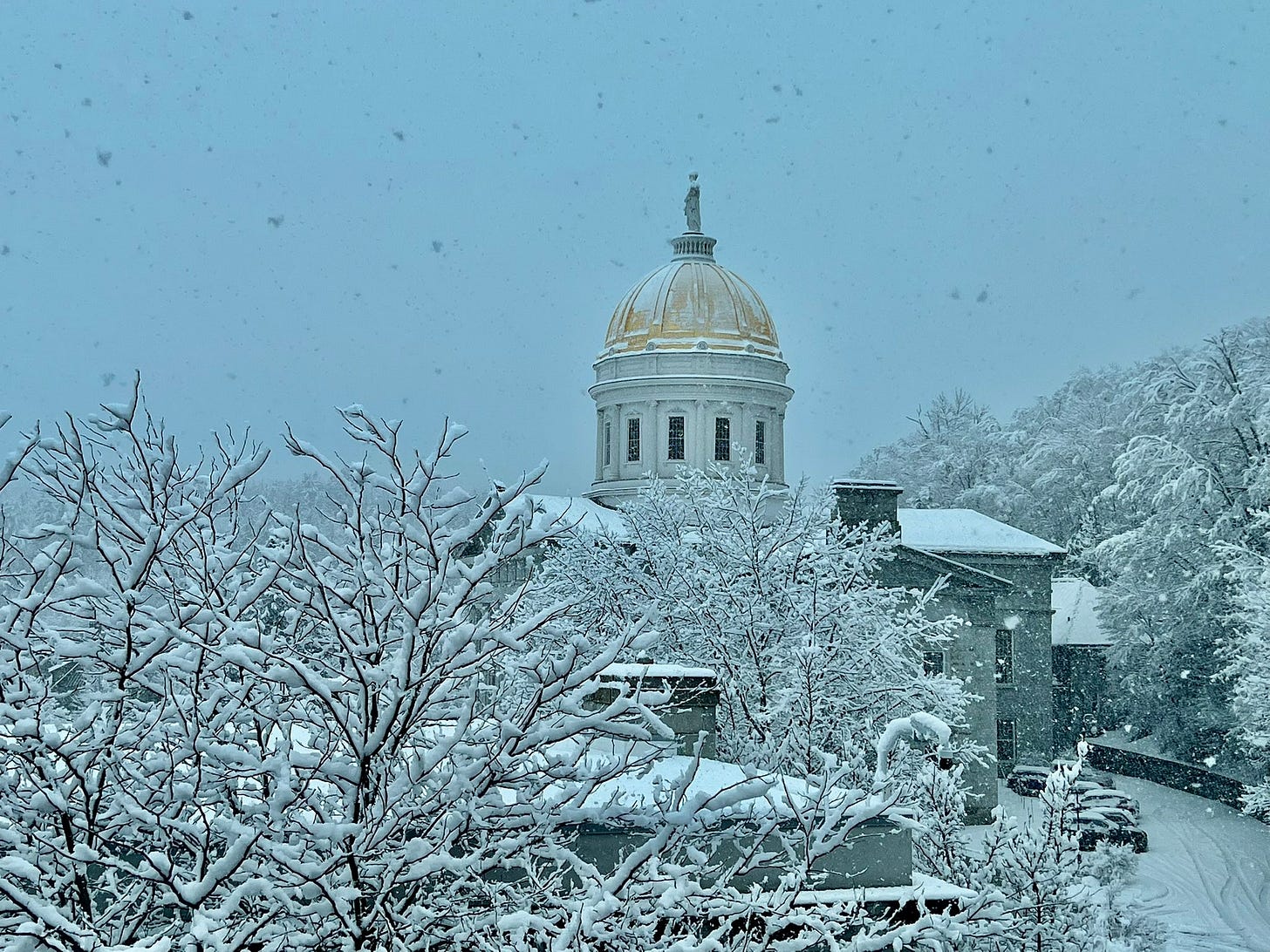VT Senate committees feud over Act 250 housing limits
Paid family leave, religious school tuition also embattled
by Guy Page
Big changes on big bills are being pushed by Senate and House chairs in the Vermont Legislature.
‘Green’ Challenge to Housing Bill – Senate Housing Bill S.100 would (among many other proposed changes) expand from 10 to 25 the number of housing lots permitted to be built without Act 250 review outside of designated downtown and growth areas. Act 250’s control – some say strangling – of large housing developments has been a sore spot for the housing industry and other supporters of construction of traditional single-family home development, of the kind little seen in Vermont in recent decades.
In response to the state’s housing shortage crisis, the Senate Economic Development Comittee voted out S.100, including raising the cap from 10 lots to 25. Au contraire, the Senate Natural Resources and Energy Committee responded with an amendment allowing 25-lot development in downtown/development areas, but otherwise restoring the 10-lot limit.
The Natural Resources version also ‘sunsets’ its limited cap expansion after three years.
Expect an intense struggle on the Senate floor between 25-lot supporters (Sens. Randy Brock, Kesha Ram Hinsdale and others) who will argue the need for more housing, and others who prefer the 10-lot status quo (Sen. Chris Bray and others) in support of protecting natural resources and reducing sprawl.
Private/Religious School Funding with Public Tuition – the House Education Committee may vote out a bill that would – in practice – prevent public school tuition to religious schools, as required by a recent U.S. Supreme Court decision.
A committee bill, numbered 23-0910 – Eligibility of approved independent schools to receive public tuition, is up for discussion today and could be voted out tomorrow, ahead of the Crossover deadline which all non-money bills must meet in order to be considered this year by the other house of the bi-cameral Legislature. This bill is a response to the State Dept. of Education’s finding that a private school tuition bill introduced earlier this year wouldn’t pass Constitutional muster based on the Carson V. Makin Supreme Court decision requiring states to pay public school tuition to private religious schools for communities with no public high school.
This committee bill would require that all private school recipients follow anti-discrimination guidelines and laws regarding LGBTQ hiring and educational policy. This guideline would violate the religious tenets of many private Christian schools, thus making them choose to 1) adopt pro-LGBTQ hiring and educational policies or 2) refuse and forfeit accss to public tuition.
Some observers see this committee bill as an obvious end-run attempt around Carson V. Makin, which if passed would likely face a similar court challenge.
In committee today, lawmakers heard discussion about whether to require all private schools – not just religious schools – to offer open enrollment. Private schools’ ability to pick and choose who to educate has long been a sticking point with advocates of public schools, which do not have that option.
Paid family leave dispute – A day before the House Committee on Housing and General Affairs expanded the scope of its universal paid family and medical leave bill, with a $100 million-plus pricetag, a key Senate chair introduced a proposal to merge child care and paid family leave initiatives at far less cost.
H.63 would add ‘safety leave’ to family and medical leave, and also expand who would qualify. Finance Chair Sen. Jane Kitchell’s proposal has yet to be discussed in depth or voted on by the Senate, but does set the tone for the Senate’s take on how money should be spent on these two high-priority policy items.
Supporters of the Kitchel plan say the Legislature can always fall back on Gov. Scott’s voluntary paid family and medical leave program, which woulc cost far less.
One high profile bill that isn’t a subject for intra-chair dispute is S.37, the abortion/transgender shield bill that also would empower the Vermont Attorney General to charge pro-life crisis pregnancy centers with ‘deceptive’ practices regarding advertising and marketing of abortion services (or lack thereof). The bill goes to the Senate floor this afternoon, where it is likely to win approval.
The following is a list of high-profile legislation scheduled for review this week.
S. 100 – Attempts to address severe housing shortages
H. 276 – Creates a rental housing registry
H. 409 – Restricting the use of restraints and seclusion in schools
23-0910 – Eligibility of approved independent schools to receive public tuition
H. 288 – Reduces liability for sale of alcohol to intoxicated persons
H. 251 – Issuance of a Brady letter, misconduct under jurisdiction of the Vermont Criminal Justice Council
H. 125 – Revises rules for various boards and commissions
H. 291 – Creates the Cybersecurity Advisory Council
H. 288 – Reduces liability for sale of alcohol to intoxicated persons
H. 27 – Coercive controlling behavior basis for abuse order
H. 230 – Reduce suicide by reducing “access to lethal means”
S. 103 – Makes even more minor or one-time discrimination unlawful
S. 102 – Strengthens employee protections, abolishes at-will termination
S. 42 – Prohibits State retirement systems from investing in fossil fuels
S. 17 – Sheriff reforms
S. 32 – Ranked-choice voting for presidential primary elections
S. 39 – Legislators’ pay and benefits
S. 27 – Reducing usage of cash bails
S. 89 – Establishes a forensic facility, allows involuntary psych treatment
S. 93 – Repeals tax exemptions for advanced wood boilers
S. 63 – Medicaid cover three rounds of in-vitro fertilization
S. 48 – Regulating sale of catalytic converters
Schedule for All Vermont Legislature Committees this week: Click on Committee name for Zoom links. Agenda listings top-line only, not inclusive. Click here to see the complete weekly schedule of all committees on one page. Click here for list of all committees and links to their bills, members and contact information.





